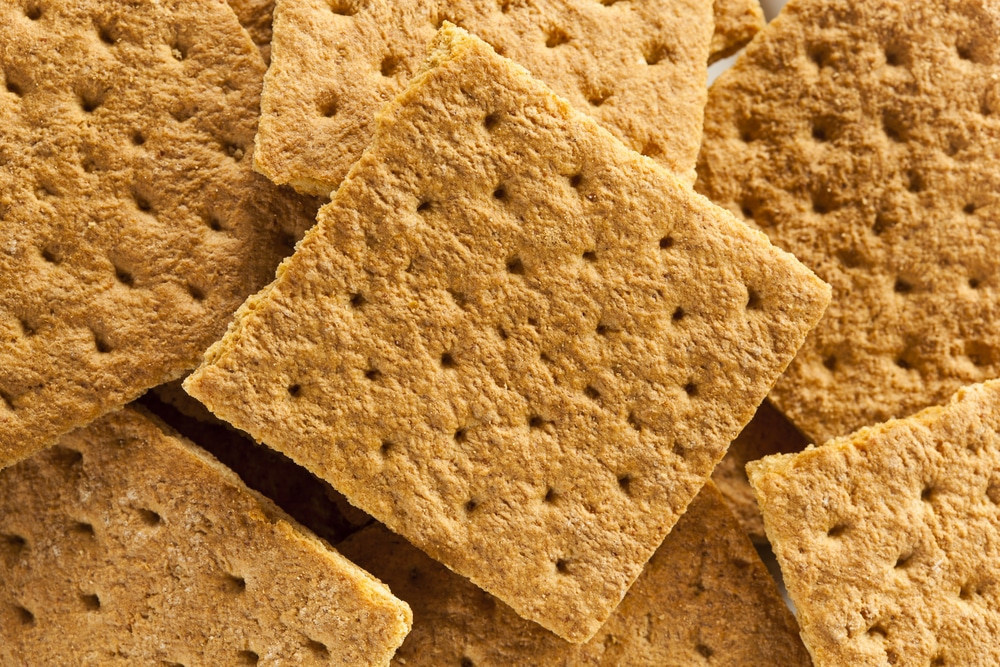Cats are known for their picky eating habits, but sometimes they surprise us by nibbling on unexpected treats. One such treat that seems to catch the attention of many cats is graham crackers. But are graham crackers safe for cats to eat? Fortunately, graham crackers are fine for felines in small amounts, but they should not be added to their regular diet as they lack the essential nutrients that cats need.
What Are Graham Crackers?
Graham crackers were created in the late 1800s in the United States, inspired by preacher Sylvester Graham. They were part of a vegetarian diet and were made with coarsely ground flour known as graham flour. Over time, graham crackers became popular and are now commonly sweetened with honey or cinnamon. They are often used in desserts like pie crusts and s’mores.
Graham crackers typically contain enriched flour, whole grain wheat flour, sugar, canola or soybean oil, preservatives, molasses, honey, baking soda, calcium phosphatase, salt, dextrose, cinnamon, soy lecithin, natural cinnamon flavor, and sodium sulfite.
Problems With Graham Crackers
Flour
Graham crackers are primarily made from coarsely ground wheat flour. While cats can technically digest small amounts of carbohydrates, their digestive systems are not well-suited for processing large quantities of wheat or grains. Consuming too many graham crackers might lead to digestive upset, and they also lack the essential nutrients that cats need for a balanced diet.
Sugar and Fats
Graham crackers often contain added sugar, fats, and oils, which are not suitable for cats. Cats are not able to taste sweetness, and consuming too much sugar or fat over time can lead to weight gain, putting your feline at risk for diabetes and joint problems.
Honey
Some varieties of graham crackers contain honey. While honey is natural, it is still high in sugar and could contribute to weight gain over time.
Cinnamon
Cinnamon is commonly used as a spice in graham crackers. While small amounts of cinnamon are generally safe for cats, consuming large quantities can lead to digestive upset, mouth sores, or even toxicity. However, it is unlikely that cats would consume enough cinnamon to cause any problems.
Salt
Some graham crackers may contain added salt, which can be harmful to cats in large doses. However, it is unlikely that cats would consume enough salt in graham crackers to cause any significant issues.
Potential Allergies
Some cats may have allergies or sensitivities to certain ingredients found in graham crackers, such as wheat. Signs of an allergic reaction can include continuous itching, scratching, overgrooming, and biting.
Benefits of Feeding Graham Crackers to Cats
Unfortunately, there is no real benefit to feeding graham crackers to cats, as they do not contain any meat, which is a crucial component of a cat’s diet. However, a small nibble of a graham cracker that your cat accidentally consumes should not cause any harm.
Alternatives to Graham Crackers for Cats
If you’re looking for alternatives to graham crackers as treats for your cat, consider the following options:
Cat Treats
Commercial cat treats are a great option as they are specifically formulated to meet feline dietary requirements. They come in various flavors and textures, so with a bit of experimentation, you will surely find something that your cat enjoys.
Cooked Meat
Cats love meat, and small amounts of cooked chicken, turkey, or fish can be tasty and safe treats for your furry friend. Boil the meat without spices, let it cool, and cut it into small pieces before serving.
Catnip
Catnip is a natural herb that many cats enjoy. You can sprinkle it on a scratching post or use catnip-infused toys to provide entertainment. It’s also a fragrant, attractive, and easy-to-grow plant that you can keep indoors or outdoors.
Dental Chews
Dental chews are similar to commercial cat treats but have special ingredients to help cats maintain their oral health. Look for products approved by the Veterinary Oral Health Council (VOHC).
Health Guidelines for Cats
It’s important to prioritize your cat’s health and well-being when choosing their diet. While graham crackers are not toxic to cats in small amounts, it’s always advisable to provide them with a diet that meets their nutritional needs. Consulting with a veterinarian is the best way to ensure that your cat’s dietary requirements are being met.
Frequently Asked Questions
Q: Are graham crackers safe for cats to eat?
A: Graham crackers are safe for cats to eat in small amounts, but they should not be a regular part of their diet.
Q: Can cats have graham crackers with honey?
A: While honey is natural, it is still high in sugar, which can be harmful to cats. It is best to avoid feeding cats graham crackers with honey.
Q: Are there any alternatives to graham crackers for cats?
A: Yes, there are several alternatives to graham crackers for cats, including commercial cat treats, cooked meat, catnip, and dental chews.
Q: Are there any health risks associated with feeding graham crackers to cats?
A: While graham crackers are not toxic to cats, they lack essential nutrients and can contribute to weight gain if consumed in excess.
Conclusion
While cats can safely eat graham crackers in small amounts, they should not be a regular part of their diet. Graham crackers lack the necessary nutrients that cats need for optimal health. Instead, it’s best to provide cats with treats specifically formulated for their dietary needs, such as commercial cat treats or small amounts of cooked meat. Prioritizing your cat’s health and well-being by consulting with a veterinarian is essential to ensure they receive a balanced and nutritious diet.
